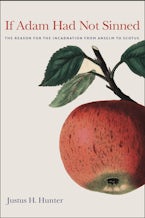Preparing your PDF for download...
There was a problem with your download, please contact the server administrator.
If Adam Had Not Sinned
The Reason for the Incarnation from Anselm to Scotus
Imprint: Catholic University of America Press
Since the twelfth century, theologians have found a counterfactual question irresistible: "If Adam had not sinned, would the Son have become incarnate?" In the latter half of the twentieth century, Hans Urs von Balthasar, Hans Küng, Gerhard Ludwig Müller, Karl Rahner, Karl Barth, Wolfhart Pannenburg, Jürgen Moltmann, and Robert Jenson all considered this question on the reason, or motive, for the incarnation. Nearly every case refers to the classic disagreement between those who follow Thomas Aquinas and those who follow John Duns Scotus.
Though it is common to claim Thomas or Scotus as one’s authority, the theological debates among which Thomas and Scotus developed their own positions remain largely neglected. This study fills that gap. If Adam Had Not Sinned is a study of the medieval debates over the motive for the incarnation from Anselm of Canterbury to John Duns Scotus. While the volume is primarily focused on thirteenth-century debates at the University of Paris, it also supplies necessary historical background to those debates. As a result, the larger context within which Thomas Aquinas and John Duns Scotus developed their influential responses is detailed. This larger context permits an analysis that leads to the surprising claim, against widespread assumptions, that the responses given by Thomas and Scotus are substantially reconcilable.
Justus H. Hunter is assistant professor of church history at United Theological Seminary, Dayton, OH.
"Hunter's contribution is two-fold: He gives a thorough account of the quesion as it developed in the 12th and 13th centuries and he introduces a series of distinctions that help to clarify the areas of agreement and disagreement among the figures discussed. Both of these are significant."
~Frederick Bauerschmidt, Loyola University Maryland
"An excellent piece of historical theology, not only because it considers a profound theological question at the heart of Christian faith--the so-called motive for the Incarnation--as asked and answered in the Middle Ages, but also because it does so with masterful historical contextualization and exquisite theological sophistication. It is exemplary in the importance of its topic, the selection of figures treated, and the nuanced analysis of the texts."
~Boyd Taylor Coolman, Boston College
"Today Catholic and Protestant theology alike commonly assume that God’s incarnation is the reason why he created the world in the first place and makes sense of everything else he does. It often goes unrecognized that this claim has already been thoroughly debated and the manifold options carefully scrutinized. With great clarity and rigor, Justus Hunter uncovers the origin and development of the medieval argument about why God became incarnate. He reshapes our understanding of the problem and offers much-needed insight into how we ourselves might solve it."
~Bruce Marshall, Southern Methodist University
"This is a study that scholars of theology and its history have needed and wanted for some time, and Justus Hunter certainly proves equal to the task of undertaking it. With clarity and insight, he traces the initial appearance and development in the West of the idea that Christ would have fittingly become Incarnate regardless of human sin and the need for redemption, attending to some lesser-known Dominican and Franciscan thinkers who made important interventions on this topic. This is a crucial study for any reader seeking to understand the origins of and nuanced opinions regarding a theological topic that remains the subject of debate to this day."
~Lydia Schumacher, King's College London
"As a work of history, Hunter’s book makes an interesting contribution to our understanding of the debates on the reason for the incarnation in the Western Europe of the High Middle Ages. As a work of contemporary systematic theology, it is an important response to previous work on the question of the incarnation by Edwin Chr. van Driel and Marilyn McCord Adams."
~Theologische Revue
"By his diligent reading of medieval theologians on their own terms and in their own context and by his rigorous and systematized analysis, Hunter offers refreshing depth and clarity. If Adam Had Not Sinned sets a high bar for future books on the reason for the incarnation, of which I hope there will be many."
~International Journal of Systematic Theology
"This brief review does not do justice to the carefulness of Hunter’s arguments, or the way in which he showcases the usefulness of possible-world analysis for understanding and elaborating on the 13th century debates."
~Reformed Faith and Practice

